2.03.2020

The station would store all required resources and also carry the lunar takeoff and landing complex:
Construction of the lunar orbital station would reduce the risks for expeditions and would allow lunar surface missions of up to 30 days, says Energia Rocket and Space Corporation CEO Nikolay Sevastyanov.
Today, the scientific community looks into two types of lunar missions, he said. In the first one, spacemen would arrive to a low near-Moon orbit of only about 200 km, and then land on the Moon in a special landing module. According to Sevastyanov, this method would allow only for short-term missions to the lunar surface - "no more than 3 days."
"The second path is to have a lunar orbit station at a height of about 10,000 km. It is possible to bring along additional resources; it is also possible to deliver a [separate] takeoff and landing complex there, so that the crew can comfortably land on the Moon, complete its mission - which might in this case take up to 30 days - and then return to the orbit station, change to the spacecraft and return back to Earth," the CEO said, adding that this option significantly reduces the risks involved.
Construction of the lunar orbital station would enable long-term missions for large spacemen teams, construction of lunar bases and conduction of large-scale operations.
"An effective transport infrastructure is needed that would enable access to various most interesting lunar surface regions, that would allow the enable the required mission length, that would allow optimal rocket carrying capacity and, in perspective, reusable vehicles. Construction of a transit station at the Moon orbit is the solution," Sevastyanov said.
The station would store all required resources and also carry the lunar takeoff and landing complex. After arriving to the station, the spacemen would change to the complex, and land on the Moon. In the meantime, their spacecraft would wait for the crew to return, using the station’s power grid.
Quelle: TASS
